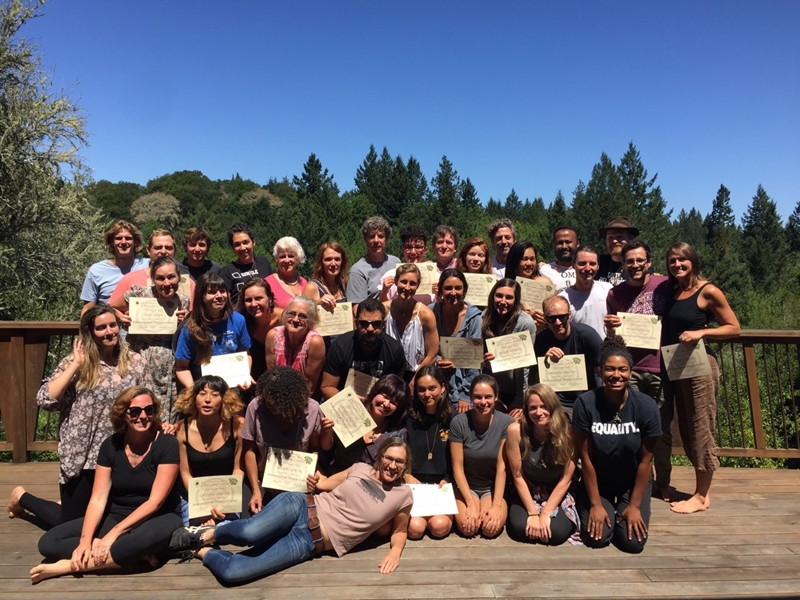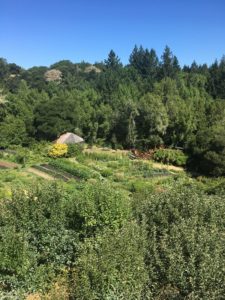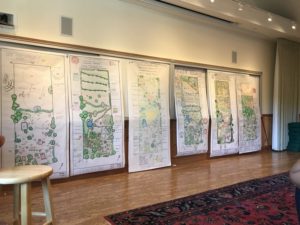By Gabriela Estrada and Kassie Munro, Program Managers

The OAEC Permaculture Design Course cohort that included Sustainable Solano Program Managers Gabriela Estrada and Kassie Munro
During Sustainable Solano’s restorative summer break, we traveled to Occidental Arts and Ecology Center, a research, demonstration, education, advocacy and community-organizing center in West Sonoma County, where they develop strategies for regional-scale community resilience and the restoration of biological and cultural diversity. For two weeks, we joined 30 other people in an intensive Permaculture Design Certificate program – frequently referred to as the PDC.
While Permaculture Design Courses follow a standardized curriculum to ensure that those who get their PDC receive comprehensive training in all of the critical systems design components, each program has a unique approach to how they immerse students in the permaculture experience, which for us meant living in yurts on the 80-acre OAEC property as part of their intentional community for the duration of the program.
Upon arrival on the first day, we all sat in a circle and were asked why we decided to attend the PDC training. What quickly became evident was that a lot of our fellow PDC-ers wanted to learn about permaculture design not only to create beautiful gardens, but to heal the earth and the people on it. As the days progressed this became more evident. Cohort members came from all walks of life and from all over the world! We had Mimi from Taiwan and our yurt-mate Mounir from Dubai. Their goal was to create a space of sustainability and social cohesion in their properties back home. Their generous attitudes were not unique among our cohort.
 The course itself was both incredibly rigorous in its training, and yet at times also felt remarkably like summer camp. Nestled in the lush Duck Bill Creek watershed of Western Sonoma County, the property boasts a number of incredible gardens, restored forest and grasslands, an irrigation pond (which doubles as a swimming hole), and countless trails to get lost on. Communal vegetarian meals cooked in the shared kitchen with ingredients from the gardens were shared three times a day.
The course itself was both incredibly rigorous in its training, and yet at times also felt remarkably like summer camp. Nestled in the lush Duck Bill Creek watershed of Western Sonoma County, the property boasts a number of incredible gardens, restored forest and grasslands, an irrigation pond (which doubles as a swimming hole), and countless trails to get lost on. Communal vegetarian meals cooked in the shared kitchen with ingredients from the gardens were shared three times a day.
While living on-site, the property became so much more than a demonstration classroom, and the experience became so much more than simply an education. With course topics covering everything from cob building and composting to botany and global water systems, the training is incredibly holistic. We even had an afternoon dedicated to learning the art of fire-making. The social permaculture teachings truly came to life in the communal living experience where we had the chance to feel and live a different way based on designing social structures to favor beneficial patterns of human behavior and attempting to create conditions that favor nurturing and empowering relationships with each other.
 The course culminated in a group design project, which for us focused on a nearby 7-acre plot of land that had recently been acquired by the Cultural Conservancy. Indigenous wisdom and learning the heritage of our host land was a focal point of the training. This came in many forms: first a small presentation by The Cultural Conservancy, then a trip to the actual site in the city of Graton, which is Southern Pomo Coast Miwok Territory. During this site visit, we all took notes, pictures and asked members of the Cultural Conservancy what they envisioned for the space to better understand their hopes and aspirations for the place. As a group, we were grateful that we were allowed to participate in a project that aims to create an inter-tribal bio-cultural heritage farm and indigenous education center. Together in a team of five, we created designs that represented all the different topics we were taught, and then on the last day presented it to the Cultural Conservancy.
The course culminated in a group design project, which for us focused on a nearby 7-acre plot of land that had recently been acquired by the Cultural Conservancy. Indigenous wisdom and learning the heritage of our host land was a focal point of the training. This came in many forms: first a small presentation by The Cultural Conservancy, then a trip to the actual site in the city of Graton, which is Southern Pomo Coast Miwok Territory. During this site visit, we all took notes, pictures and asked members of the Cultural Conservancy what they envisioned for the space to better understand their hopes and aspirations for the place. As a group, we were grateful that we were allowed to participate in a project that aims to create an inter-tribal bio-cultural heritage farm and indigenous education center. Together in a team of five, we created designs that represented all the different topics we were taught, and then on the last day presented it to the Cultural Conservancy.
It was a true honor to be a part of a tangible and valuable regenerative restoration project during our course. Belonging to an organization such as Sustainable Solano, whose core principals are permaculture-based, it has been very valuable to obtain Permaculture Design Certification. As program managers, this certification will allow us to infuse permaculture design principles and guiding ethics more deeply into our work, allowing us to continue shaping programs that approach sustainability through the lenses of social, environmental and economic equity.

